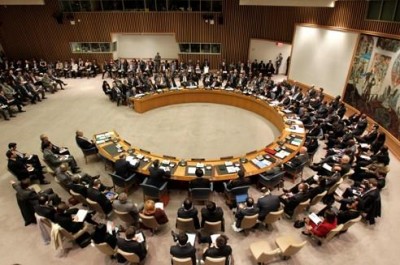Chinese Diplomat Unmasks “Hypocritical” Slams against China’s Veto on Syria Sanctions

As Russia and China vetoed it, the UN Security Council failed to adopt a draft resolution on Syria sanctions on 28th February. But what impressed is the seven-minute-long explanation given by a Chinese diplomat on the reasons behind the decision, in which he unmasked the “extremely hypocritical” faces of some powers.
The defeated resolution, drafted by Britain, France and the US, aimed to impose sanctions over alleged use of chemical weapons in Syria. If adopted, the draft resolution would have imposed asset freezes and travel bans on individuals and entities associated with the Syrian government.
The British, US and Japanese representatives pointed blame at China and Russia after their veto against the draft. UK’s permanent representative to the UN Matthew Rycroft told the council that he was astonished by Russia’s abuse of veto power, and was “surprised and disappointed” that China had also cast a veto.
Chinese permanent representative to the UN Liu Jieyi fought back those denouncements with a rare seven and a half minutes’ long speech.
“We oppose the use of chemical weapons by any state, any organization and any individual under any circumstance, and support the punishments against all instances of chemical weapons use,”said Liu.
“As a victim of chemical weapons back in those days, China has more right than any other country to condemn its use,” the diplomat added.
He also called on relevant countries to reflect on history to prevent from repeated catastrophes, citing the Middle East region as an example.
“We still remember the huge disasters brought by some countries after they waged wars against the region by alleging the latter of possessing large amount of weapons of mass destruction, and the Middle East still has not shaken itself from its after-effects,” Liu underlined.
He stressed that “it is too early to reach a final conclusion” since investigations on the use of chemical weapons are still ongoing, adding that a forcible vote amid serious disagreements of members did not help solve the chemical weapons issue in Syria, let alone the political settlement of the Syrian crisis.
In his last seconds of off-script remarks, Liu asked relevant stakeholders to reflect on how Syria and the Middle East were allowed to degenerate to their current situations, and what parts they played in this process.
“Which actions are good and which ones are ulterior? It is extremely hypocritical to take the interests of the public only in words,” the ambassador emphasized.
Zheng Qirong, a UN studies expert at China Foreign Affairs University, said that Liu’s relatively long statement is the latest case of Chinese representatives sending detailed, timely and clear-cut messages refuting slams or misunderstandings from the outside world.
But he pointed out that as the US and Russia are now wrestling their influence in Middle East affairs, the outside world will focus more on China’s positions.

